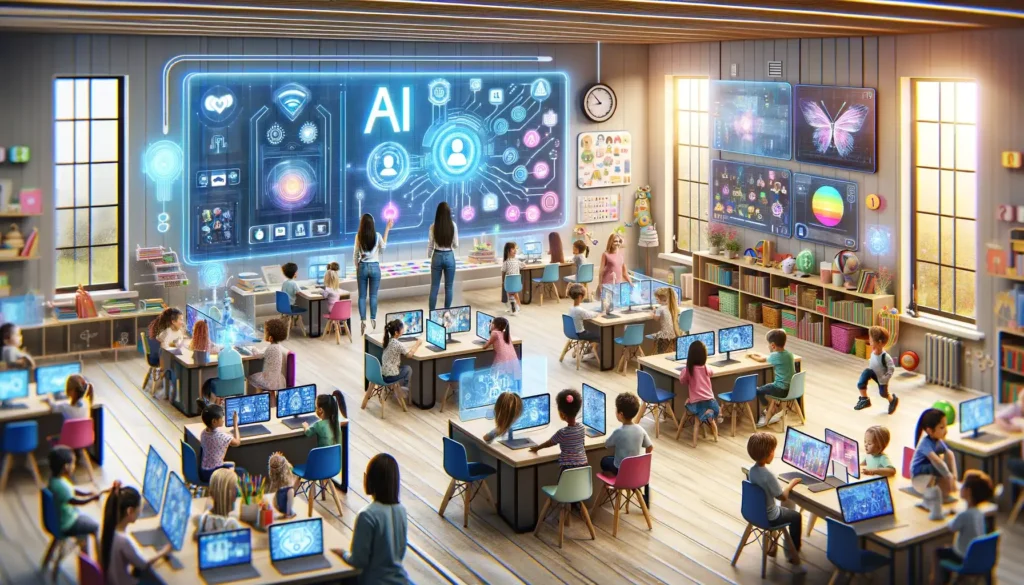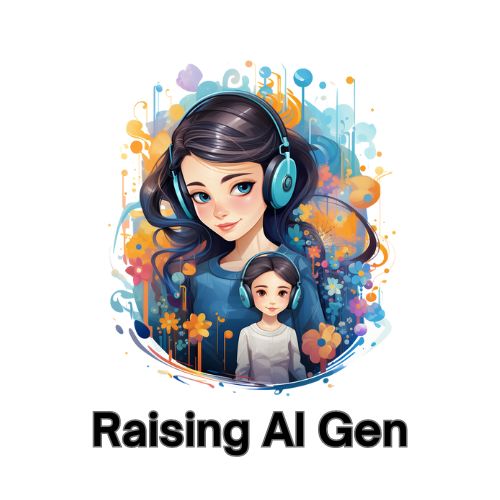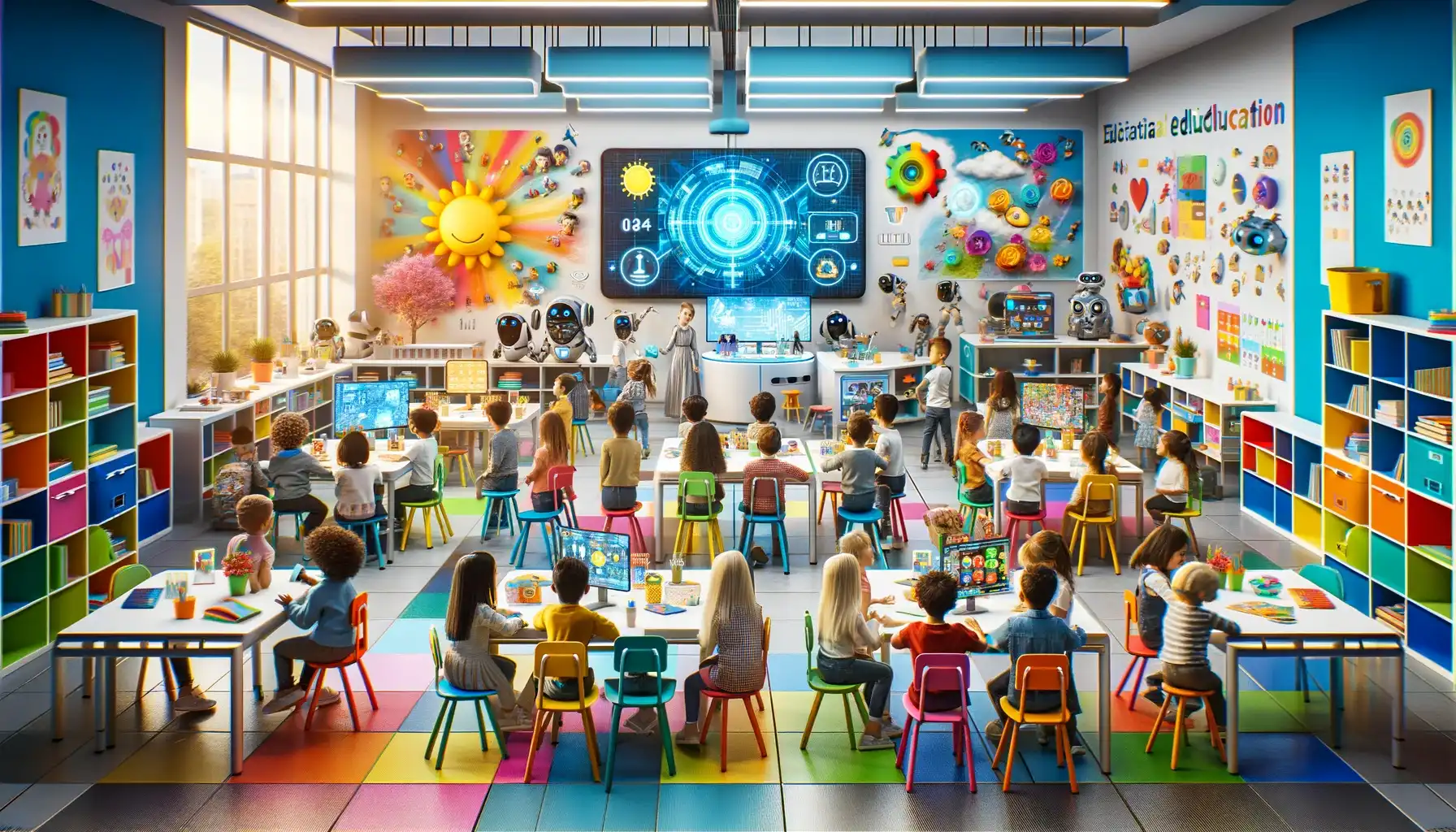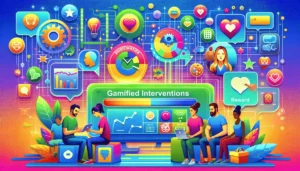Artificial Intelligence (AI) in Early Childhood Education is not just a futuristic concept; it’s a rapidly evolving reality shaping the way our youngest learners engage with the world. Gone are the days when AI was merely associated with robots and complex machinery.
Today, it stands at the forefront of educational innovation, offering unique opportunities to enhance learning experiences from a very early age. This shift marks a significant transformation in the educational landscape, making it essential for educators, parents, and policymakers to understand and embrace the potential of AI in shaping the futures of young learners.
Key Takeaways
- Understanding AI: AI refers to the development of computer systems that can perform tasks typically requiring human intelligence. These include learning, problem-solving, and decision-making.
- AI’s Role in Education: In early childhood education, AI is being utilized to create interactive, personalized learning experiences. It’s not just about technology; it’s about redefining the educational journey for children.
- Evolving Classrooms: The traditional classroom is evolving with AI, bringing in tools and techniques that cater to the unique learning needs of each child.
Why AI Matters in Early Education:
- Enhanced Learning: AI provides tailored educational experiences, making learning more engaging and effective for young minds.
- Accessibility: AI tools help break down barriers in education, making learning accessible to all children, including those with special needs.
- Teacher Support: AI can handle administrative tasks, allowing teachers to focus more on teaching and less on paperwork.
Discover more about AI educational apps for kids and how they are revolutionizing early education.
The Transformative Impact of AI
Artificial Intelligence (AI) is not just altering the landscape of advanced industries; it’s reshaping the foundational stages of education. In early childhood, where the building blocks of learning are laid, AI brings a transformative touch, enhancing the way educators teach and children learn.
AI in Action: Real-world Applications
Streamlining Administrative Tasks
AI is revolutionizing classroom management by automating routine tasks. This shift allows educators to dedicate more time to their primary role: teaching. AI tools efficiently handle tasks like:
- Attendance tracking
- Grading assignments
- Managing student records
Enhancing Learning with Assistive Technology
AI’s impact extends to inclusivity in education. It provides tailored support to children with diverse academic and physical needs, ensuring no child is left behind. Key areas include:
- Speech therapy applications
- Interactive learning tools for various learning styles
- Customized support for children with disabilities
Interactive Learning through Games
AI-powered games offer an engaging way for children to learn basic skills. These games are not just fun; they adapt to each child’s learning pace, making education a truly personalized experience.
Breaking Language Barriers
AI is a bridge for multilingual education, offering real-time translation and language learning tools. This not only aids children in learning new languages but also supports those who speak different languages at home.
Personalized Learning: AI’s Crown Jewel
AI shines brightest in its ability to tailor education to individual needs. This personalized approach is particularly beneficial in early childhood education, where children’s learning speeds and styles vary greatly.
AI systems analyze learning patterns and adjust content accordingly, ensuring each child receives the support they need to thrive.
Benefits of Personalized Learning:
- Individual Pace: AI adapts to each child’s learning speed, keeping them engaged and motivated.
- Diverse Learning Styles: Whether a child is a visual learner or needs hands-on activities, AI tools cater to these varying needs.
- Continuous Assessment: AI’s ongoing assessment helps identify areas where a child might need extra help, allowing for timely intervention.
Learn about the role of AI in personalized learning and how it’s shaping the future of education.
Pros and Cons of AI in Education
The integration of Artificial Intelligence (AI) in early childhood education brings a host of benefits, but it also raises certain challenges.
Understanding these pros and cons is vital for educators, parents, and policymakers to navigate this new landscape effectively.
The Bright Side of AI in Early Education
Personalized Tutoring
AI enables a form of tutoring that is tailored to each child’s unique learning needs, ensuring a solid academic foundation from an early age.
Setting the Learning Pace
Children learn at different rates, and AI helps personalize the pace of learning for each child, keeping them engaged and reducing disengagement in lessons.
Learning Beyond the Classroom
AI-powered learning tools allow children to continue their educational journey outside the classroom without relying solely on parental instruction.
Reducing Teacher Burden
AI can significantly reduce the workload on teachers by automating administrative tasks, thereby reducing burnout and retaining quality educators in the field.
Supporting Children with Special Needs
AI provides additional support for children with unique physical and academic needs, helping to level the playing field in education.
| Factor | Pros of AI in Early Childhood Education | Cons of AI in Early Childhood Education |
| Personalized Learning | AI can tailor instruction to each child’s unique needs and learning pace, providing personalized support and maximizing their learning potential. | Over-reliance on AI could limit opportunities for human interaction and personalized teacher-child relationships. |
| Support for Special Needs | AI-powered tools can provide personalized interventions, adaptive learning pathways, and real-time feedback for children with special needs. | Data privacy concerns surrounding the collection and use of sensitive student data. |
| Enhancing Early Learning Outcomes | AI can enhance early learning outcomes by providing individualized instruction, identifying areas for improvement, and promoting cognitive development. | Potential for algorithmic bias, where AI algorithms may perpetuate existing inequities and stereotypes. |
| Automated Assessments and Feedback | AI can provide automated assessments and real-time feedback, allowing teachers to focus on providing personalized support and instruction. | Lack of human oversight and interpretation of AI-generated assessments, potentially leading to misdiagnosis or oversimplification of complex learning issues. |
| Promoting Creativity and Problem-Solving | AI-powered games and simulations can foster creativity, problem-solving, and critical thinking skills in children. | Overdependence on technology could hinder the development of essential social and emotional skills that require human interaction and collaboration. |
| Cost Considerations | Implementing AI-powered tools and platforms may require significant initial investments and ongoing maintenance costs. | Ethical considerations regarding the use of AI in early childhood education, ensuring transparency and accountability in its implementation. |
The Challenges of AI in Education
The Cost Factor
The expense of implementing AI programs can be prohibitive, potentially limiting access in underfunded schools or districts.
Potential Bias
AI systems might inherit biases from their developers, leading to unequal or unfair educational experiences for some children.
Privacy Concerns
With AI collecting data on children’s learning patterns, there is a significant need to protect their privacy and ensure data security.
Fear of Replacing Teachers
While AI enhances education, there’s a concern that it might lead to an over-reliance on technology, overshadowing the critical role of human teachers.
Interpretation of Data
AI systems generate vast amounts of data that teachers need to interpret, requiring them to develop new skills to effectively use this information.
Learn more about the impact of AI tools in education and how they are reshaping the educational landscape.
Ethical and Social Implications
As we embrace the wonders of Artificial Intelligence (AI) in early childhood education, it’s crucial to navigate the ethical and social terrain it brings along. AI has the power to shape young minds, and with great power comes great responsibility.
The ethical use of AI in education must be a priority to ensure that its benefits are maximized while minimizing potential harms.
Navigating the ‘3A2S’ Framework in AI
The ‘3A2S’ framework is a comprehensive approach to evaluating AI’s role in education, focusing on Accessibility, Affordability, Accountability, Sustainability, and Social Justice. Here’s how AI impacts each aspect:
Accessibility
AI can bridge learning gaps, offering access to quality education for children across various socio-economic backgrounds. However, the question remains: can all children access these AI tools equally?
Affordability
While AI offers innovative learning solutions, the cost of these technologies must be manageable for schools and families, especially in less affluent areas.
Accountability
Educators and developers are responsible for ensuring AI tools are used appropriately in early childhood education, maintaining a balance between technological and traditional learning methods.
Sustainability
The sustainability of AI in education hinges on its ability to support long-term educational goals without causing resource strains or ethical dilemmas.
Social Justice
AI in education should promote fairness and equity, addressing the ‘AI divide’ between those with access to these technologies and those without.
Ethical Considerations in AI for Education
The ethical deployment of AI in early education is non-negotiable. Concerns include:
- Data Privacy: Ensuring the privacy and security of children’s data is paramount.
- Bias and Fairness: AI must be free from biases that could affect the quality and fairness of education.
- Transparency: Teachers and parents should understand how AI tools work and how they influence children’s learning.
Future Prospects and Research in AI-Driven Early Education
The journey of AI in early childhood education is just beginning. With rapid advancements in technology, the future holds immense possibilities for further enhancing and personalizing the educational experiences of young learners.
Research in this field is crucial for understanding the full potential of AI and addressing any challenges that arise.
Key Research Areas in AI and Early Education
Developing AI-Based ECE Policies
Policymakers and educators need to collaborate on developing policies that leverage AI’s strengths while safeguarding against its risks. This involves creating guidelines that ensure equitable access, protect privacy, and promote ethical use of AI in classrooms.
Assessing the Effectiveness of AI Programs
Continual assessment and research are needed to evaluate the effectiveness of AI tools in advancing learning outcomes. This includes studying their impact on various learning styles and their ability to adapt to individual children’s needs.
Ethical Use of AI in Diverse Contexts
Understanding the ethical implications of AI across different cultural and social contexts is essential. Research should focus on ensuring that AI tools are culturally sensitive and inclusive.
Exploring AI’s Impact on Child Development
Investigating how AI influences cognitive, social, and emotional development in young children will provide insights into how to best integrate these tools into early education.
Involvement of Parents and Families
Researching the role of parents and families in AI-driven education will help in developing strategies for home-school collaboration, ensuring a holistic approach to learning.
AI’s Role in the Early Childhood Industry
Exploring AI’s potential in advancing the broader early childhood industry, including its application in educational content creation, teacher training, and administrative efficiency.

Moving Forward with AI in Education
As we look towards the future, it’s clear that AI will continue to play a significant role in shaping early childhood education. The key to success lies in balancing technological innovation with human insight and ethical considerations. Ongoing research and development, coupled with collaboration among educators, developers, and policymakers, will ensure that AI remains a positive force in the educational landscape.
Embrace the AI Revolution in Early Education
As we reach the end of our exploration into how AI is revolutionizing early childhood education, it’s clear that we stand at the brink of a new era in learning. AI is not just a tool; it’s a catalyst for change, offering unprecedented opportunities to enhance and personalize education for our youngest learners.
The Future is Now: AI in Every Classroom
AI’s potential in early education is limitless. From creating personalized learning environments to providing equitable access to quality education, AI is paving the way for a future where every child can achieve their full potential. The journey ahead is exciting, and it’s crucial that we embrace these changes with open arms and minds.
Your Role in Shaping the Future
Whether you’re an educator, parent, student, or simply an enthusiast of educational technology, your role in this AI-driven educational revolution is vital. Staying informed, open to change, and proactive in understanding and utilizing AI will be key to making the most of these advancements.
Join the AI Education Movement
- Educators: Explore and integrate AI tools in your classrooms. Stay updated on the latest AI advancements and how they can benefit your teaching methods and your students’ learning experiences.
- Parents: Engage with AI-based learning tools and resources to support your child’s education at home. Be a part of their learning journey in this new digital era.
- Policy Makers: Develop and implement policies that promote the ethical use of AI in education, ensuring equitable access and safeguarding privacy and data security.
- Students and Enthusiasts: Dive into the world of AI. Understand its applications in education and explore how you can contribute to or benefit from this technological revolution.
- Everyone: Stay curious and informed. Visit AI educational apps for kids and AI in STEM education to learn more and see AI in action.
The AI revolution in early childhood education is not just about technological advancement; it’s about building a brighter future for the next generation. By embracing AI, we open doors to endless possibilities, where learning is more engaging, inclusive, and effective.
Let’s join hands in this journey of transformation and be a part of the exciting world of AI in education.
Frequently Asked Questions About AI in Early Childhood Education
| Question | Answer |
|---|---|
| What is AI in the context of early childhood education? | AI in early childhood education refers to the use of advanced computer systems to enhance learning experiences, offering personalized, interactive, and accessible educational content. |
| How does AI benefit young learners? | AI benefits young learners by providing personalized learning experiences, supporting diverse learning styles, enhancing accessibility for children with special needs, and enabling continuous learning outside the classroom. |
| Can AI replace teachers in the classroom? | No, AI cannot replace teachers. It is designed to assist and enhance the teaching process, not replace the critical human interaction and guidance that teachers provide. |
| Is AI in education expensive? | The cost of AI in education varies. While some AI tools can be expensive, there are also cost-effective options. The key is to balance the benefits with affordability and accessibility. |
| How does AI handle data privacy? | AI systems must be designed with strict data privacy protocols to protect the sensitive information of young learners. This includes secure data storage and handling, as well as compliance with privacy laws and regulations. |
| Are there ethical concerns with using AI in education? | Yes, ethical concerns include ensuring that AI tools are free of bias, protecting student privacy, and maintaining a balanced approach to tech-based and traditional learning methods. |
| How can educators integrate AI into their teaching? | Educators can integrate AI by using AI-powered educational apps, interactive games, and tools for personalized learning and assessment, as well as staying informed about the latest AI educational technologies. |
| What role do parents play in AI-driven education? | Parents can support AI-driven education by engaging with AI tools at home, understanding how these tools benefit their child’s learning, and collaborating with educators to ensure a holistic learning experience. |
Further Reading
| Topic | Link |
|---|---|
| AI Educational Apps for Kids | Read More |
| AI in STEM Education | Read More |
| Fun and Educational AI Activities | Read More |
| Introducing AI to Children | Read More |
| AI Tools for Teachers | Read More |
| AI Personalized Learning | Read More |
| AI for Language Learning | Read More |
| AI Speech Therapy | Read More |
| AI Tools for Autism | Read More |
| AI for Educators | Read More |





